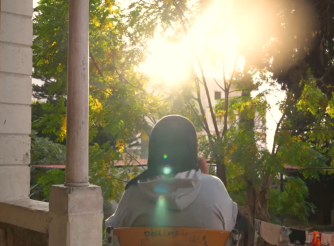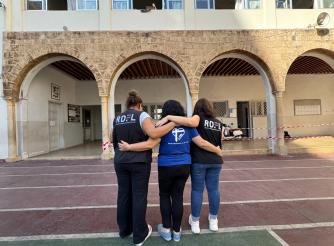As Lebanon ceasefire deadline looms, families are still reeling from Israeli forces’ attacks

Nearly 60 days after the conditional ceasefire in Lebanon came into effect, life is yet to return to normal for countless families uprooted by Israeli forces’ attacks.
With the ceasefire set to expire on 26 January, ActionAid has released a series of powerful photographs by Lebanese photographer Dalia Khamissy, which tell of young people and their families still struggling with grief and uncertainty in the wake of the conflict.
Tens of thousands of residents were forced to flee from the historic city of Baalbek in October when Israeli forces issued a city-wide evacuation warning. Among them was 22-year-old Marwa, who fled with her family after a bomb struck near their home.
“We thought we'd leave for two days and come back. We thought everything would calm down in a few days and we would be able to go back home,” said Marwa. “Little did we know that two days would become 66 days away from home.”
When Marwa’s family returned home after the ceasefire, they were met with devastation.
“When we opened the door, the blackness we saw, the smell of gunpowder... It was a sad scene. To leave your house where you lived a normal life, and come back to a scene of destruction, glass, everything on the floor. It made us sad to see it like that.
“Losing one's house, means losing memories. Losing dreams. To lose it so suddenly it feels like losing their whole life. [It’s] where they lived and grew up, where they got married, where they accomplished their goals. It's very hard to lose your house. Losing bricks is nothing compared to losing people. But, sometimes, bricks mean a lot to people.”
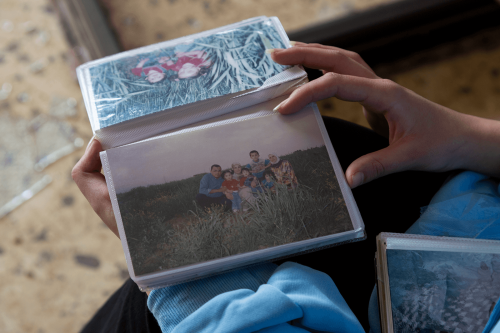
Between 23 September and 31 October last year, Israeli forces launched over 3,300 airstrikes across Lebanon, displacing more than 1.3 million people, according to analysis by ActionAid and Oxfam.
More than 770,000 of those who were displaced within Lebanon have returned home since the ceasefire was agreed in November, according to the UN. Yet many returned to find their homes in ruins, forcing families to live with relatives or in tents, ActionAid said.
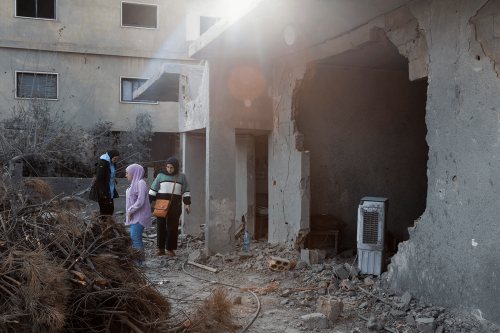
“Not everyone was able to return home,” said Malak, a 29-year-old Palestinian, who lives in a refugee camp in Baalbek. “My sister, for example, is still living with us because the house where she lived is almost entirely destroyed – nothing remains. Their whole street is destroyed. And now it's hard to find places to rent, because too many homes have been destroyed so there aren't enough places.”
Forced displacement is prohibited under International Humanitarian Law. A report published by ActionAid and Oxfam last month found that the forced displacement orders imposed by Israeli forces during its 62-day war were neither legitimate nor safe, leaving families without shelter or protection and raising serious concerns about potential crimes against humanity.
The report also highlights the widespread psychological distress and anxiety caused by Israeli forces’ attacks. Anxiety that still looms for Malak.
“If the agreement falls apart, things could be even worse. We still have these thoughts even now. The jets haven't stopped flying. This is not a ceasefire. The jets and the drones are always flying over. The sounds are the same. The difference is that they are not bombing here - that's it,” Malak said.
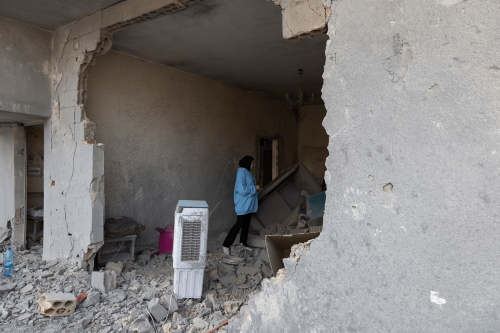
For Marwa, too, returning home hasn’t brought peace.
“Now we’ve returned home and are living normally, I'm having difficulty restoring the feeling of safety ... Of course, we'll restore [our home] to better than it was. But honestly, the war has affected us as people. More so than the effect it had on the houses and bricks.”
ActionAid is urging the international community to condemn and address violations of International Humanitarian Law and to ensure that displaced families in the south of Lebanon can safely return to their homes.
Sabine Abiaad, ActionAid’s Campaigns Coordinator in Beirut, said:
“Many families returned home to wreckage, while others are still unable to return due to ongoing restrictions by Israeli forces. The international community must pressure Israel to immediately allow the safe and unconditional return of displaced families and hold those responsible for violations of International Humanitarian law accountable.”
To ensure that the tens of thousands of people in Lebanon still unable to return home can rebuild their lives – and to preserve Lebanon's fragile peace – ActionAid is calling for the urgent establishment of a permanent, unconditional ceasefire in both Lebanon and Gaza.
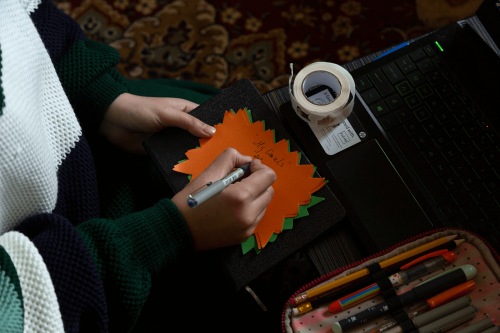
All images by Dalia Khamissy, a Lebanese photographer based in Beirut, Lebanon. Her work since then has revolved around social and political stories in the Middle East. Read more about her work here.
